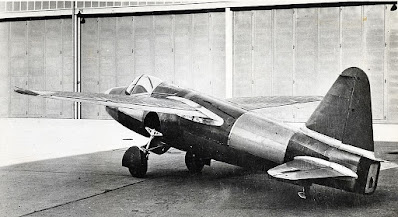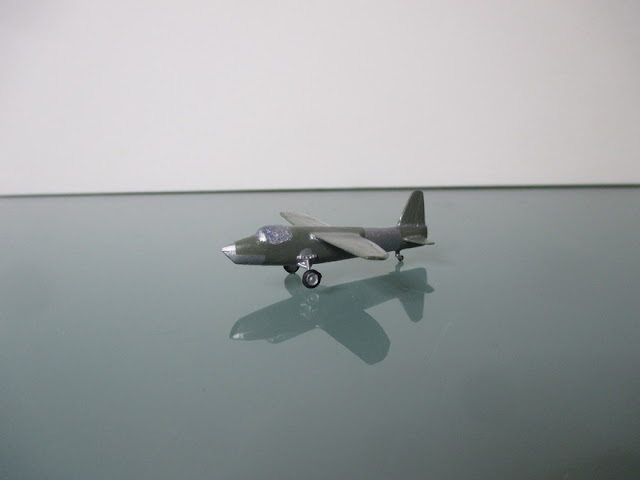A la suite des recherches de l'ingénieur allemand Hans-Joachim Pabst von Ohain sur la turbine à gaz, l'avionneur Heinkel a conçu le Heinkel He 178, un avion expérimental de construction mixte métal et bois qui sera le premier avion au monde à voler grâce à la poussée d'un turboréacteur.
Le Heinkel He 178 V1 a réalisé son vol premier vol en août 1939, d'une durée de 6 minutes.
Mais l'avion n'a pas impressionné les responsables de la Luftwaffe, avec seulement une vitesse maximale de 598 kilomètres par heure et une autonomie tout aussi faible faible...
Heinkel a ensuite développé un autre prototype à réaction, mais cette fois bimoteur, le He 280, puis réalisera à la fin de la guerre, le Heinkel 162 qui, lui, sera en service, mais trop tard.
Following the research of the German engineer Hans-Joachim Pabst von Ohain on the gas turbine, the aircraft manufacturer Heinkel designed the Heinkel He 178, an experimental aircraft of mixed metal and wood construction which will be the first aircraft in the world to fly thanks to the thrust of a turbojet.
The Heinkel He 178 V1 made its first flight in August 1939, lasting 6 minutes.
But the plane failed to impress Luftwaffe officials, with only a maximum speed of 598 kilometers per hour and an equally low range...
Heinkel then developed another jet prototype, but this time twin-engined, the He 280, then produced at the end of the war, the Heinkel 162 which was in service, but too late.
Le modèle présenté ici a été coulé en métal à partir du kit en impression 3D réalisé par Dameya.
Le montage et la décoration n'ont pas posé de problèmes si ce n'est que j'ai failli faire une erreur en envisageant de créer des trappes pour les trains d'atterrissage, telles qu'elles apparaissaient sur certaines photos trouvées sur internet (voir ci-dessus).
Mais en réalité, les photos du Heinkel 178 avec des trappes de train d'atterrissage représentent le plus souvent le second prototype, le V2, qui volait uniquement comme planeur non motorisé et qu'on reconnait aux bouts d'ailes carrés.
Le Heinkel He 178 V1, que l'on reconnaît ci-dessous, notamment sur les photos tirées du film du premier vol (les photos floues), avec les bouts d'ailes arrondis, avait certes un train d’atterrissage classique mais qui a été maintenu fixe.
The model shown here was cast in metal from the 3D printed kit made by Dameya.
The assembly and decoration did not pose any problems except that I almost made a mistake when considering creating landing gear doors, as they appeared in some photos found on the internet (see above).
But in reality, photos of the Heinkel 178 with landing gear doors most often represent the second prototype, the V2, which flew only as an unpowered glider and which can be recognized by the square wingtips.
The Heinkel He 178 V1, which we recognize below, in particular in the photos taken from the film of the first flight (the blurry photos), with the rounded wingtips, did have conventional landing gear, but which was kept fixed.
1/144 Heinkel He 178 V1 - prototype








Aucun commentaire:
Enregistrer un commentaire